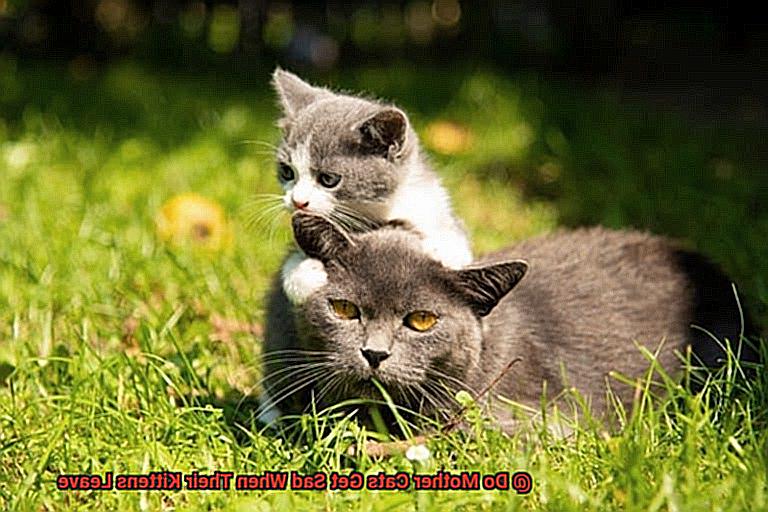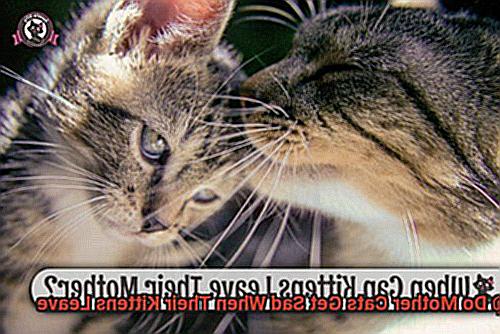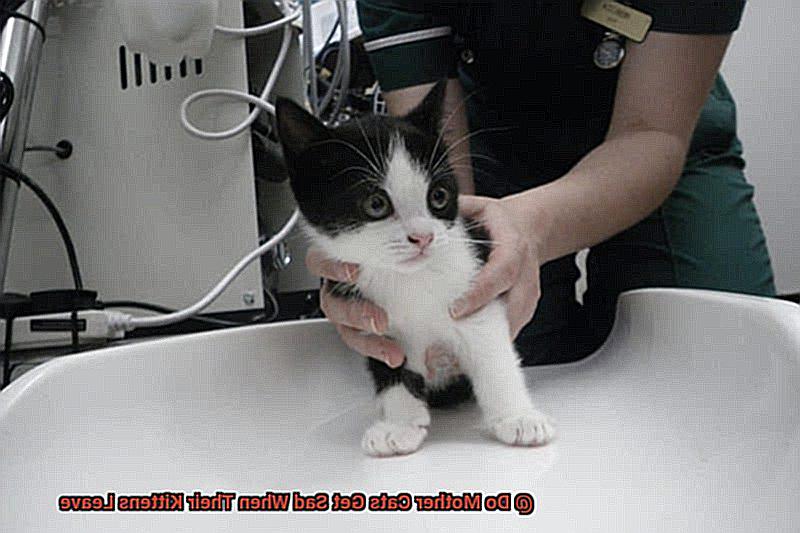The bond between a mother cat and her kittens is undeniably strong, often considered one of the most remarkable in the animal kingdom.
As pet owners, we cherish these moments of watching our feline friends protect and care for their young until they are ready to venture out on their own. But as the time approaches for the kittens to leave, it’s natural to wonder how their mothers feel about it.
Many cat owners have asked themselves whether mother cats get sad or angry when their babies depart. It’s a fascinating topic that has intrigued us for years.
However, the answer isn’t as straightforward as you might expect. Cats are known for being adaptable creatures, so their emotions may not manifest in the same way humans do.
Plus, there are several factors at play that can influence a mother cat’s reaction to her kittens leaving – such as age, litter size, and nursing duration. In this blog post, we’ll delve into feline emotions and explore whether mother cats experience sadness when their kittens leave.
We’ll examine warning signs to watch out for and investigate the psychology behind their behavior. Plus, we’ll share some helpful tips for cat owners who want to ease this transition for both mom and kittens alike.
So, buckle up and get ready to discover the emotional depths of our beloved feline friends.
What Are the Signs of a Mother Cat Missing Her Kittens?
When the time comes for the little ones to leave, the mother cat may suffer from a variety of emotions, including sadness, anxiety, and even depression.
These emotions are completely normal and understandable. If a mother cat is separated from her kittens, she may show several signs of missing them.
One of the most noticeable symptoms is excessive vocalization. The mother cat will meow loudly and persistently, searching for her kittens and calling out to them.
It’s like she’s frantically looking for her missing child in a crowded place, but they’re nowhere to be found. Another sign that the mother cat is missing her kittens is restlessness.
She may pace back and forth or become more clingy than usual, seeking attention and comfort from her human caregivers. It’s as if she’s looking for something to do or someone to help ease her anxiety.
Physical symptoms can also indicate that a mother cat is missing her kittens. She may lose interest in food and water or overeat in an attempt to soothe herself.

Additionally, she may become lethargic and sleep more than usual. It’s similar to how humans experience physical signs when they’re feeling down.

It’s important to note that not all mother cats will display these signs when separated from their kittens. Some cats may appear unfazed by the separation, while others may show only mild symptoms.
However, if you notice any of these signs in your cat, it’s vital to give her extra attention and comfort to help her cope with the loss of her kittens. To help a mother cat who has lost her kittens or is suffering from their separation, it’s recommended that she be given more attention, love, and support.
You can distract her from her sadness by giving her snacks and playtime. It’s also beneficial to have a warm, cozy space for her to rest.
How Long Does It Take for a Mother Cat to Forget Her Kittens?
The answer isn’t straightforward since it depends on various factors, such as the individual cat’s temperament and the circumstances surrounding the separation.
Typically, as kittens grow older and become more independent, their mother will lose interest in them. This is a natural part of the weaning process and helps the kittens learn to fend for themselves.

However, this doesn’t mean that the mother cat completely forgets about her offspring. Cats have amazing memories and can recognize their kittens even after long periods of separation.
In fact, some mother cats may become distressed when they’re reunited with their grown-up kittens since they may not recognize them at first. The amount of time it takes for a mother cat to forget her kittens can also depend on other factors, such as how long they spent together and the bonding experience during nursing and caring for the kittens.
Furthermore, a cat’s temperament can have a significant impact on how quickly she forgets her kittens. Some cats are more attached to their offspring than others, so it’s essential to understand your cat’s personality and cater to her needs accordingly.
During this transition period, when mother cats start to lose interest in their kittens as they grow older, it’s vital to provide proper care and attention to both mother cats and their kittens. Separation can be challenging for both sides of the relationship, so it’s essential to ensure everyone remains healthy and happy.
If you notice your cat excessively meowing or pacing back and forth after separation, it’s a sign that she’s missing her little ones and needs extra attention and support from you to cope with the loss.
Can Kittens Stay With Their Mother Forever?
While the idea of keeping your fluffy little feline with her mother may seem tempting, it’s important to understand that separation is a natural part of a cat’s life cycle.
During the first few weeks of their lives, kittens heavily rely on their mother for essential care and nutrients. However, as they grow older and become more independent, they need to start exploring their surroundings and interacting with other cats.
Typically, it’s recommended to separate kittens from their mother when they are between 8 to 12 weeks old. Some may believe that keeping kittens with their mother for longer periods can be helpful, but in reality, it can hinder their growth.
Kittens need to develop social skills and learn how to communicate with other cats to survive in the wild. Keeping them isolated with their mother can make it difficult for them to adapt to new environments and thrive in the future.
It’s important to note that the bond between a mother cat and her offspring is complex and unique. Although a mother cat may show interest in her grown-up kittens, she never completely forgets them.
In fact, some mothers may even become distressed if reunited with their offspring after lengthy periods of separation. In summary, while kittens cannot live with their mother forever, separating them is crucial for their development.

It ensures that they have a solid foundation for future interactions with other cats and can thrive in their new environment.
Is It Cruel to Separate Kittens From Their Mother?
The answer is not as simple as a yes or no, as timing plays a significant role in determining the well-being of both the kittens and their mother.

It’s important to note that separating kittens from their mother too early can have negative effects on their physical and emotional health. Studies have shown that kittens who are separated before they are fully weaned and have learned important social skills from their mother and littermates may be at a higher risk of developing behavioral problems such as aggression and anxiety.
Additionally, they may have weaker immune systems and be more susceptible to illnesses. But it’s not just the kittens who may suffer from early separation.
The mother cat can also experience stress, restlessness, and more frequent vocalization after her kittens are taken away. To ease her stress and help her adjust to the separation, it’s crucial to provide her with plenty of attention, affection, and comfort.
So, when is the appropriate time for separation? The ideal time is around 12 weeks of age when the kittens are fully weaned and have learned valuable social skills from their mother and littermates.

At this point, they are ready to thrive in new environments and develop further social skills. In conclusion, separating kittens from their mother too early can have detrimental consequences on both the kittens and the mother cat’s physical and emotional health.
It’s essential to wait until the kittens are fully weaned and have acquired valuable social skills before separating them from their mother.

Do Cat Moms Miss Their Kittens?
Absolutely. Just like human mothers, cats form a strong bond with their offspring, and it can be hard for them to say goodbye.
The degree of sadness varies from cat to cat, but it’s safe to say that most moms experience a sense of loss when their kittens leave.
The mourning period can last anywhere from a few days to several weeks, depending on the individual cat’s personality and temperament. During this time, a mother cat may become more vocal or clingy than usual.
She may sleep more or seek comfort from her human companions. Some cats may even exhibit signs of depression like loss of appetite or lethargy.
As responsible pet owners, it’s our duty to provide emotional support and comfort to our furry companions during this challenging time. We can do this by spending extra time with our cats, playing with them, and showering them with love and attention.
It’s also important to maintain a routine and provide a secure environment for our cats to feel safe. In summary, cat moms do miss their kittens when they leave, so it’s crucial to be sensitive to their emotional needs during this time.
sD9d4fSm_3Y” >
How to Comfort a Mother Cat Who Lost Her Kittens
Losing her kittens can be devastating for a mother cat, and it’s essential to provide her with the necessary care and comfort during this difficult time. Here are five sub-sections that break down how to comfort a mother cat who has lost her kittens.
Create a Calm and Peaceful Environment
The first step in comforting a mother cat who has lost her kittens is to create a calm and peaceful environment for her. Reduce the noise level, provide a comfortable space for her to rest, and ensure that she has access to food and water. Remember that cats are sensitive creatures and may need time to adjust to their new surroundings.
Provide Love and Attention
It’s crucial to spend time with the mother cat and provide her with affection and attention. You can do this by petting her or talking to her in a soothing voice. Additionally, providing her with toys or other forms of stimulation can help distract her from the loss of her kittens.
Offer a Surrogate Kitten

Another way to comfort a mother cat who has lost her kittens is to offer her a surrogate kitten. This can be done by providing her with a stuffed animal or even another kitten who needs a mother figure. However, it’s important to ensure that the surrogate kitten is healthy and has received proper vaccinations before introducing it to the mother cat.
Create a Safe Space
Creating a safe space for the mother cat is also critical. This can be a cozy corner or a separate room in the house where she can retreat and be alone if she needs to. Providing her with a warm, comfortable bed, fresh water, and food will also help her feel more secure.
Seek Professional Help
In some cases, a mother cat may become depressed or exhibit signs of grief after losing her kittens. If this occurs, it may be necessary to seek the guidance of a veterinarian or animal behaviorist. They can provide additional support and guidance on how best to care for the mother cat during this difficult time.
So, providing a mother cat with love, attention, and a calm environment can go a long way in helping her cope with the loss of her kittens. With time and patience, she will eventually heal and begin to move forward from this difficult experience.
Also Read: How Do I Know If A Mother Cat Has Abandoned Her Kittens?
Conclusion
To sum up, the bond between a mother cat and her kittens is unbreakable.
It’s natural to wonder how a mother cat feels when it’s time for her little ones to leave. Although cats are adaptable creatures, their emotions may not be as visible as humans’.
However, most mothers experience a sense of loss as their kittens depart. It’s crucial to keep an eye out for warning signs that indicate that a mother cat misses her kittens.
These signs include excessive vocalization, hunger, and physical symptoms such as lethargy or weight loss. Extra care and compassion can help them cope with their loss.
While it’s essential for kittens to grow independently from their mothers, they should not be separated too early. Separating them at 12 weeks of age is ideal for both the kittens’ and the mother cat’s emotional and physical well-being.







